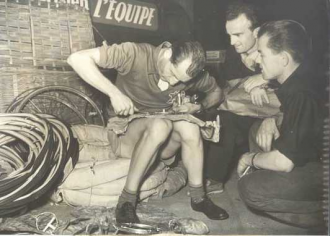He’s Got to Do It All Over Again

Strange as it may seem some younger Doctor Wine readers may never have heard of Gino Bartali. He was a great, immense cycling champion who during the war helped the partisans and whose only misfortune was to be of the same generation as Fausto Coppi, who beat him often but also sometimes took a whooping. He was a man who never minced words and at the age of almost 80, when he was one of the first anchors of the satirical news show 'Strisca la Notizia' (Rip the News), he would often say, in his Tuscan dialect: ''He's got it all wrong, he's got to do it all over''. That's ''got it all wrong'' is also something you can apply to politics, the economy and certainly to wine and food critics, who now never more than risk of appearing like the French queen Marie Antoinette. When told the people were protesting the lack of bread, she replied: ''Let them eat cake''.
Why do I make this comparison? It is because today to be politically correct food-wise you have to be in favor of locally grown products that are organic and bio-dynamic, handcrafted, seasonal and all this regardless of whether they are economically feasible. During a time of crisis, who can really afford to spend more, even if this is justified by better quality and greater compatibility with a sustainable environment.? Former Brazilian president Lula, who governed over a country that uses a lot of GMOs, who made gasoline out of cane sugar because it cost less, replied to criticism that all this was all not very 'leftish' by saying he would gladly do it differently if someone knew how to differently feed over 200 million people.
In the small world of wine a division is taking place between those who consider wine a commodity and those, much fewer, who feel it has more to do with culture and tradition, as well as personal enjoyment. In the first case price/cost is the key factor, together with the facility it can be found on the market and its appeal with the consumer. For those in the second group, wine is an 'élite' product for educated consumers and experts, choices are made based on criteria far removed from economics. For sure price is important but it is not paramount. What is important are factors like the method used in wine-making, the origin of the grapes and its iconic significance. Added on to this are questions like whether it is 'organic' and compatible with a sustainable environment. At present these people are a small minority, at least for now. If wine criticism were to focus only on them, as has recently been the case in Italy, it would certainly be of great importance, perhaps even elitist, but perhaps also a bit snobbish and pseudo-intellectual, especially considering that the 'real' world is turning in a different direction. Exports of Italian wines are for the most part made up of honest and inexpensive wines, that for the most part rarely cost more than three or four euros a bottle. And these are the companies that are having success abroad, where their bottles are often placed on the same shelf as the more 'important' and expensive wines. At the end of the day, what good is criticism if it cannot recognize and perhaps even foresee consumer trends? In a way a critic also performs a public service, by offering advice and stimulating curiosity, and should never scare the consumer with choices that are much too far from main street.

 Italiano
Italiano








